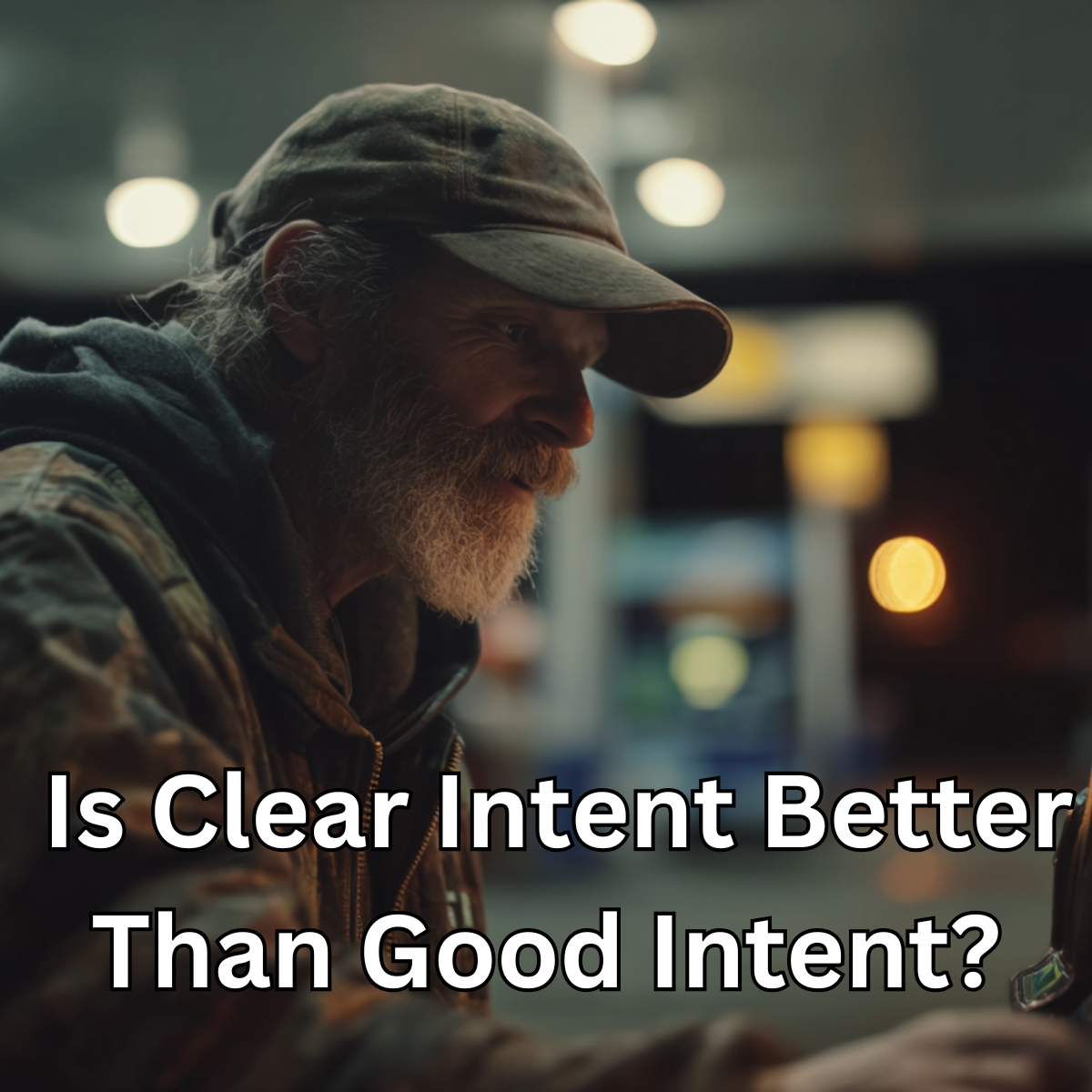I have been working on this theory for a while now: clear intent is better than good intent. I am not completely confident in this idea yet, but I’ve been realizing lately that what one person thinks is good may not necessarily be good for others, or even most others. This seems like a relative concept, which I generally disdain. I never excuse bad behavior by claiming its perception is relative. I am also quite convinced that truth exists regardless of what humans want the truth to be. Just because we want something to be true does not make it so.
However, in this particular theory, good intent is effectively the desire for a person to change, manipulate, or direct a situation down a particular path because they feel it is the right thing to do. Thus, the desires of one person to do good or influence others to do good are susceptible to relativity.
Setting aside philosophical considerations of independent truth for this exploration, intent becomes highly subject to the whims of the influencer. This begs the question—which is better: the supposed good intent of the influencer or the clarity of what the influencer is trying to accomplish? This theory was recently put to the test during a leadership strategy meeting where several people were asked to divulge their intent. It wasn’t labeled as intent, but that is exactly what it was. Interestingly, in many cases, leaders had the same intent, but in several others, their intents were diametrically opposed. All these individuals were well-intentioned, believing their intent was right, yet in certain areas, harmony was lacking. It seems to me that rather than having leaders exert influence covertly, openly discussing and revealing their intent yields a much better outcome. Don’t misunderstand me: doing good is important, but doing good with the full understanding of those you work with or serve is infinitely better. At the end of the day, the good you believe you are pushing for may not be the best for others; it’s essential to find out.
A few years ago, I debated the ethics of censorship, another worthwhile test of this theory. The individual I debated advocated actively censoring social media. I cannot disclose the person’s or organization’s name. The individual was adamant about their responsibility to limit, restrict, and even edit opinions they deemed inappropriate. Initially, I assumed they meant restricting actions like yelling “fire” in a crowded theater, but it turned out they advocated curtailing opinions contrary to their perception of the public good. While I defend a company’s right to manage its platform as it sees fit, this instance involved a single employee asserting personal influence. My theory was applicable here: this person thought they were doing good by silencing dissenting opinions but failed to realize many others viewed such clandestine censorship as wrong. After discussion, we agreed it was best to openly voice and circulate this intent. Clarity of intent was necessary to evaluate whether the original intent was genuinely good.
This brings me to another consideration: perhaps clarifying your intent is the best action because you might discover your original intent is misguided. Good intent informed solely by your perspective and the bubble you live in can be problematic. For instance, someone from an affluent area observes a homeless person shoplifting a candy bar from a convenience store. Outraged, they exert influence to pass sweeping legislation with heavy punishments, aiming to prevent judicial diversion and increase penalties. They feel accomplished, believing they’ve done good. However, they fail to consider the impact on less affluent communities with significant homeless populations. Crime statistics spike, courts clog, and systems become overwhelmed. Their “good” intent inadvertently causes substantial harm. Clearly voicing their intent and seeking other opinions might have uncovered better solutions. The time, energy, and money spent on sweeping legislation might have been more effectively used to address the root causes of homelessness directly. Unfortunately, such misguided well-intentioned actions frequently occur in society, causing unintended harm.
We often live under an “us versus them” mentality, frequently pushed by entities seeking mass appeal—corporations, well-funded social initiatives, or political parties. Someone recently mentioned the media promoting the red versus blue concept, pitting us against each other. I questioned whether this accurately depicted reality. In fact, two political parties raise billions of dollars and spend it on media, making them two of the largest global advertisers. It’s no surprise we find ourselves entrenched in constant political dichotomy. I’ve often thought that if ten people were put in a room and prohibited from revealing political affiliations, they’d likely agree on many issues and quickly find reasonable solutions. There would be outliers, but generally, more consensus than conflict would emerge. The false assumption that “the other side” is irrational prevents us from revealing our intent, fearing exposure. This mindset is dangerous because we may actually be the ones in error, trapped in a false dichotomy and unaware due to our unwillingness to clarify our intent.
Although political examples illustrate this theory, its greatest relevance lies within organizations. When people come together, disagreements are inevitable. Two admirable individuals with good intentions may differ in approach, style, and methods. This is precisely why my theory is valid: if we believe our good intent is better hidden, we risk becoming adversaries with equally well-intentioned people. The same scenario playing out politically can happen in companies: two competent, well-intentioned professionals become at odds, each viewing the other as misguided.
This scenario is ineffective for any functional unit. Consequently, I increasingly believe that clarifying your intent is more important than believing your intent is inherently good.




